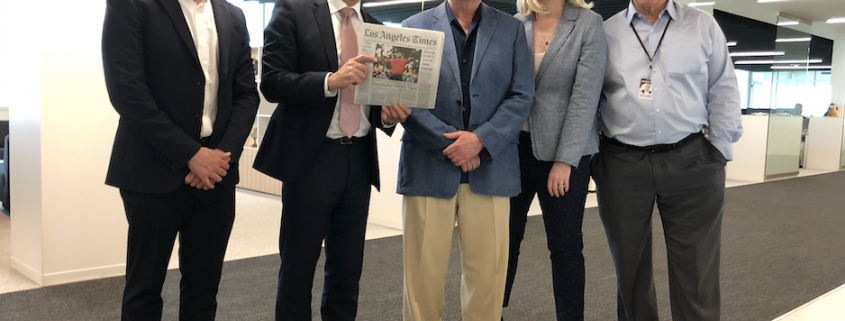LA Times, USC alumnus win Pulitzer for USC investigation

The Los Angeles Times won the Pulitzer Prize Monday for investigative reporting for its series of stories uncovering the abuse of hundreds of former and current USC students at the hands of former campus gynecologist George Tyndall.
In a May 2018 article titled, “A USC doctor was accused of bad behavior with young women for years. The university let him continue treating students,” Times reporters Harriet Ryan, Matt Hamilton and Paul Pringle revealed over 20 allegations of abuse against Tyndall.
Columbia University announced the winners of the 2019 Pulitzer Prizes, which were awarded on the recommendation of the Pulitzer Prize Board. In a video posted on the Times website, the newspaper’s El Segundo office cheered and applauded after the announcement was made.
According to the Times, this is the 45th Pulitzer Prize the newspaper has won since 1942.
“It was overwhelming and a huge honor — just a tribute to the commitment that the L.A. Times had put into covering USC and a credit to all the brave people at USC who spoke to us, many of them anonymously,” said Hamilton, a USC alumnus.
In the wake of the investigation, which rocked the USC community, former University President C. L. Max Nikias resigned amid calls from faculty, students and staff and Interim President Wanda Austin took office. After Austin’s appointment in August 2019, the University conducted a nationwide search for the University’s next president, which concluded with the selection of Carol Folt March 20.
“The award recognizes an extraordinary piece of journalism that continues the Los Angeles Times’ commitment to public service journalism and stories that have real impact on the lives of our readers,” L.A. Times Executive Editor Norman Pearlstein wrote in a statement to the Daily Trojan. “Through all of the turmoil of the last few years, the one constant has been the newsroom’s commitment to public service journalism.”
Since the investigation was published, the L.A. Times has revealed multiple investigations and reports about the University’s role in the scandal and the ongoing state and federal lawsuits against USC and Tyndall. In October, USC agreed to a $215 million class action settlement, which will distribute tiers of compensation to current and former patients of Tyndall.
The series inspired investigations into Tyndall and the University’s knowledge of the abuse. The Los Angeles Police Department called the scandal the largest-ever sex abuse scandal in the department’s history. As of mid-March, there are over 650 plaintiffs across several lawsuits against Tyndall and the University.
“In terms of impact, I think it was nothing that any of us working on the story could have foreseen,” Hamilton said. “That so many former patients of Tyndall would come forward. That so many professors would mobilize and protest against the administration — and specifically Max Nikias. It was shocking, and we certainly didn’t predict any of it.”
Hamilton, who graduated with a master’s degree in journalism in 2014, said the impact of the story on the USC community is what mattered most.
“I think what mattered is that it got the attention of the people who work at USC, who attended there and study there and care deeply about the University,” Hamilton said. “It had an impact on alumni and parents of students as well.”
Hamilton said during his two years of reporting on USC for the Times, he has seen changes in the administration
“[In] the process of selecting the new president, there was much more openness with the community than in prior times,” Hamilton said. “The leadership at the Trustee level and the administration seem to recognize that transparency is important and that the old ways of doing business need to be reformed.”
During his graduate education, Hamilton participated in Annenberg TV News and Neon Tommy, a now-defunct online media platform sponsored by Annenberg. He credits his USC education for providing him with a nuanced perspective in reporting.
“It’s undeniable that I see the University differently than other reporters do,” Hamilton said. “When it comes to the reporter trying to hold an institution accountable, I probably approach it differently having been a student. And I think I care deeply about the University because it gave me such a positive and great education.”
According to the L.A. Times, the investigation began when Ryan received an anonymous tip in February 2018 that revealed Tyndall’s abuse. The reporters spent three months interviewing sources and victims.
“Harriet and Paul are both such amazing and dedicated and thorough and tenacious reporters,” Hamilton said. “It was like a masterclass in investigative journalism, being able to work beside them … Each of us brought different things to the table.”

